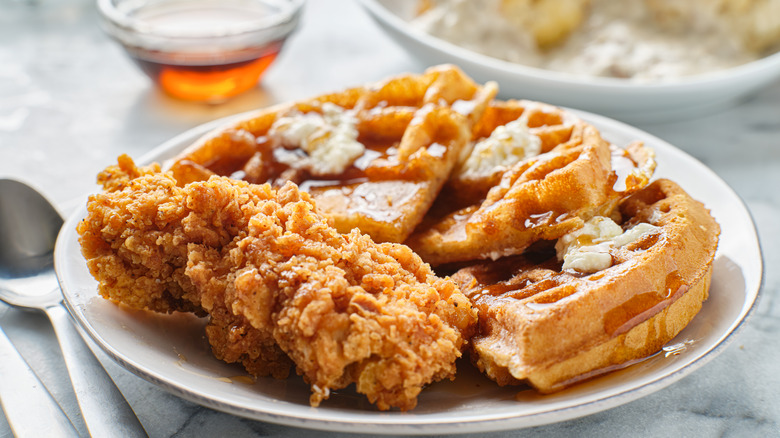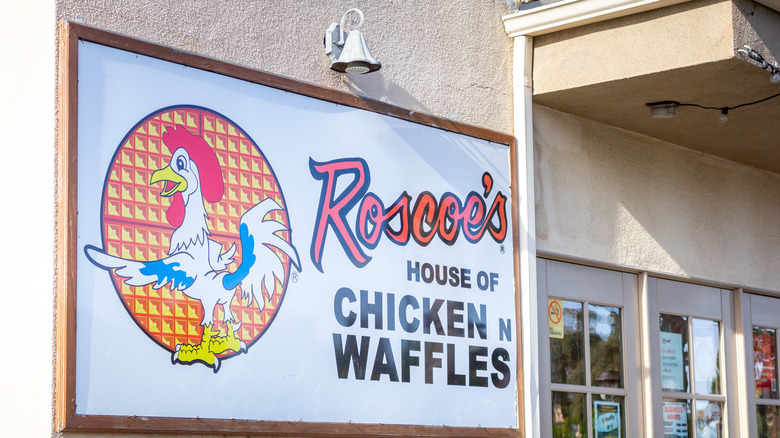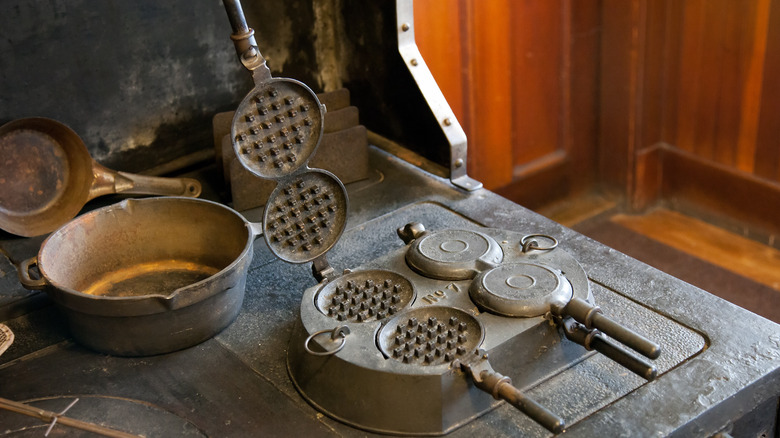The Mysterious Origins Of Chicken And Waffles
Chicken and waffles deliver the perfect contrasts for a delicious brunch — sweet yet savory, crunchy and fluffy, and definitely heart-warming. It's a miracle of a hangover cure and a breakfast-inflected meal that hits hard any hour of the day. Some may still find the combination unusual, but when you deconstruct the dish it's simply chicken (or turkey for a twist!) laid beside griddle-cooked dough.
The dish's popularization is accredited to two restaurants: first, Wells House of Chicken in Harlem and later Roscoe's House of Chicken and Waffles in Los Angeles (via Resy). Both highly-influential institutions, many wrongly cite them as the inventors of the combination when they were simply the first to deliver it to urban coastal hubs.
It's easy to understand the strong affiliation when considering Roscoe's cultural fame. Their introduction of chicken and waffles in California led to features in five Hollywood films, including Jackie Brown (via Magnet Magazine), and an attempted buyout by Snoop Dogg (via CBS) when the restaurant declared bankruptcy. Thankfully, the esteemed establishment is alive and well, with eight operational locations (via Roscoe's House of Chicken and Waffles).
Yet, following the cultural popularization of the dish does little to reveal its origins. Where did chicken and waffles actually come from?
Southern rebuttal against chicken and waffles
Frequently associated with the South, likely via soul food, identifying a geographical birthplace for the bird on a waffle is not so straightforward. When NPR ran a piece acknowledging the health detriments of Southern food (sadly, chicken and waffles included), many readers responded with outraged reactions to the regional inclusion. One especially impassioned reader even remarked, "This is a Yankee-fied interpretation of a southern staple," in a later follow up at NPR.
In an assimilatory, roaming culture like the United States, pinpointing roots is complex. The frequency of consumption in a certain region does not necessarily translate to origin (like the aforementioned Roscoe's), and large migrational shifts carry dishes across the nation, sweeping away any deeply-embedded geographic links. It turns out that's precisely what happened with chicken and waffles. As food writer John T. Edge told NPR in their follow up, "It's a Southern dish, but a Southern dish once or twice removed from the South."
Even still, generalizing the dish as simply Southern doesn't fully reveal the layers of its creation.
Two parallel origin stories
Realistically, chicken and waffles emerged in American cuisine as an intermixing of two culinary traditions; the food of European settlers, mainly German and Dutch, and African-American cuisine. According to MyRecipes, the dish's proto-form likely started from enslaved Africans cooking golden crispy rice waffles and serving them with brined and fried chicken.
Concurrently, food writer William Woys Weaver notes in his book "As American as Shoofly Pie: The Foodlore and Fakelore of Pennsylvania Dutch Cuisine" that the Dutch served "creatures stewed and poured over waffles," and Adrian Miller highlights in "Soul Food The Surprising Story of an American Cuisine, One Plate at a Time" that German settlers served "chicken and waffles smothered in gravy," which became a Sunday plantation standard.
Differentiating the stronger influence between these traditions is now impossible, but it's logical to suggest that intermingling occurred, especially in the South. The region becomes the most apparent link through such a cultural crossover, especially with the dish's stronghold in Black-owned businesses. Throughout the 19th century, many African-Americans left the South and reestablished communities in places like Harlem (via The U.S. National Archives and Records Administration), hence the dish's notoriety in urban centers on both coasts.
No matter the regional affiliation, chicken and waffles is a verifiably American creation backed by a Black heritage that tragically tends to be erased by history (via the New York Times). There's a remarkable quality to the dish's amalgamation of components, a balancing of contrasts that make it a delightful brunch option ready to be spiffed up for any occasion.


